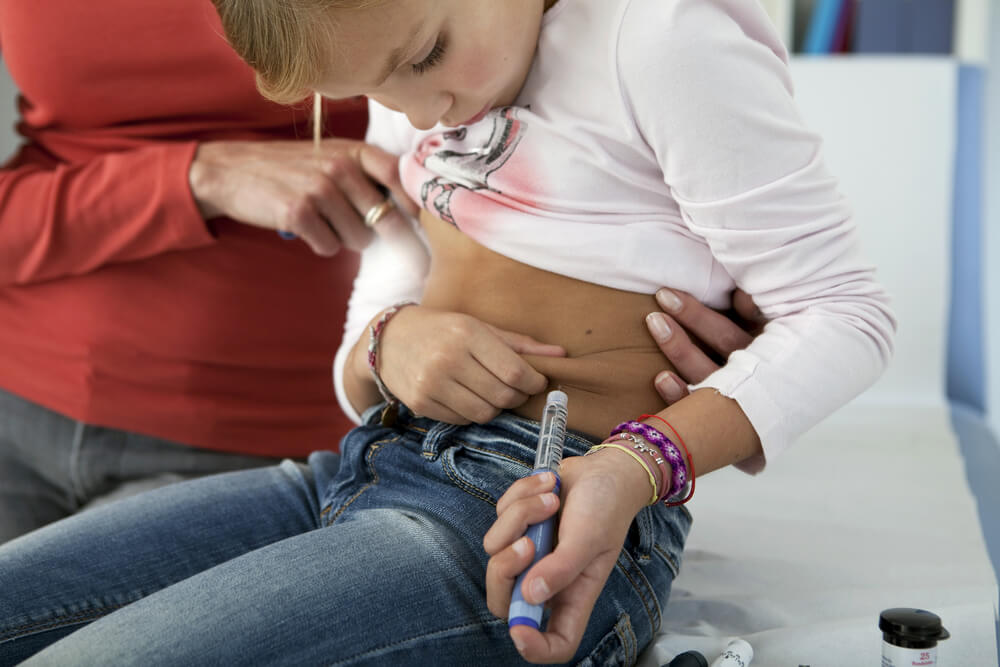Concerned Your Child May Have Diabetes?
The Pediatric Endocrine and Metabolic Center of Florida will share warning signs of Type 1 or Juvenile Diabetes in this article. If your child is experiencing any of these symptoms, please make an appointment with the PEMC right away to see one of our pediatricians. We have years of experience in preventing diabetes in children and a plethora of advice and guidance to give, helping to make living with this disease easier on everyone in your family. We are here to help!
What is Diabetes?
Type 1 Diabetes, or Juvenile Diabetes, is a condition in which your child’s body can no longer produce insulin in their pancreas. Because insulin is needed to survive, the missing insulin must be replaced with injections or an insulin pump. In rare circumstances, it can develop in adults, but it primarily develops in children. At the PEMC, we know a diagnosis of Type 1 Diabetes can be overwhelming, and we work to find science preventing diabetes in children. Education and action, such as administering insulin injections, counting carbohydrates, and monitoring blood sugar, are all crucial tools in managing Type 1 Diabetes.
What Causes Diabetes?
The cause of Type 1 Diabetes is not known, but in most cases, the body’s immune system, which normally fights off harmful bacteria and viruses, starts mistakenly destroying insulin-producing cells in the pancreas. It is thought that genetics and environmental factors appear to play a role as well. Once the insulin-producing cells or islet cells of the pancreas are destroyed, your child produces little to no insulin. Our bodies need insulin because it moves sugar, or glucose, from the bloodstream to the body’s cells. Without adequate insulin, sugar builds up in your child’s bloodstream, and life-threatening complications arise if left untreated.
Type 1 and Type 2 Diabetes

Type 1 Diabetes – The body cannot produce any insulin.
Type 2 Diabetes – The body becomes resistant to insulin or creates it in insufficient quantities.
Since the majority of Type 1 Diabetes patients are children, they may not understand or be able to articulate the signs of the disease or what they are experiencing or feeling. As parents and guardians, we have to be proactive in digesting and understanding knowledge of symptoms of Diabetes in children, and we must create daily, structured, regular treatment plans for people living with the disease.
Signs of Type 1 Diabetes in Children
Managing your child’s Type 1 Diabetes is a lifelong commitment, and as your child grows and changes, their treatment plan will change too. From monitoring blood sugar, administering insulin therapy to encouraging healthy eating and regular exercise, the parent or guardian’s role in managing diabetes is vital. Are you curious about signs of diabetes in toddlers, signs of diabetes in babies, and symptoms of diabetes in infants?
If your child displays one or a combination of the signs and symptoms below, they should be evaluated by their pediatrician as soon as possible. Here are some symptoms of high blood sugar in a child:
Increased Thirst
The body can become dehydrated because of frequent urination. To replenish these lost fluids, the body needs additional fluids and causes the child to feel extremely thirsty. If your child is asking for water too frequently, speak to their doctor, as increased or excessive thirst are warning signs of diabetes in toddlers and diabetes in babies.
Diabetes and Bedwetting
Diabetic bedwetting is normal and very common in children with Type 1 Diabetes. When excess sugar builds up in your child’s bloodstream, it creates a toxic environment for the blood and pulls fluid from tissues. Because of this, your child’s thirst increases, and they begin to urinate more than usual. This can lead to diabetic bedwetting. Even a young, toilet-trained child may suddenly start wetting the bed. Diabetes and bedwetting go hand in hand for young children. Frequent urination is one of the prominent warning signs of Type 1 Diabetes.
Excessive Hunger
If you are healthy, food changes to glucose after you eat it. When someone living with Type 1 Diabetes has a meal, the glucose cannot be used in the body due to a lack of insulin. This is another symptom of high blood sugar in a child. Insulin helps deliver glucose molecules to the cells, making you feel low in energy and excessively hungry or working with an increased appetite.
Fruity Smelling Breath
When the body starts using fat to produce energy, this creates ketones in the body, which then create a fruity-smelling fragrance to the breath. High levels of ketones in the body can lead to a serious, life-threatening condition called ketoacidosis.
Weight Loss
Weight loss is often the first sign of Type 1 Diabetes in children. Even if they are feeling hungrier and are eating more, your child can rapidly lose weight. Symptoms of high blood sugar in child deprives the body of energy and leads to a decline in muscle and body mass.
Feeling Fatigued or Weak
Because there is a high amount of sugar in the blood that cannot be used by cells, Diabetes can make a person feel weak and exhausted. Excessive or unexplained fatigue and weakness should be promptly evaluated by a physician.
Change in Mood and Behavior
Because of the flux of blood sugar levels in Type 1 Diabetes, mood swings or a decline in performance is to be expected at first.
Blurry Vision
High blood sugar levels may lead to blurry vision. When blood sugar levels are controlled, the vision returns to normal. Vision changes are an early sign of Type 1 Diabetes.
Yeast Infection
Girls and women living with Type 1 Diabetes may develop genital yeast infections. Symptoms of diabetes in infants include diaper rashes caused by yeast. High blood sugar levels lead to an overgrowth in vaginal yeast, bacteria, and fungi. Managing blood sugar is the key solution to reducing the frequency of yeast infection.
Nausea or Vomiting
When the body burns fat and muscles instead of carbohydrates to expel energy, it releases ketones. In high levels, ketones can cause toxicity in the blood, leading to nausea and vomiting.
A simple urinalysis can diagnose Diabetes, and the signs and symptoms of the disease typically develop quickly in children over a period of weeks. A simple urine analysis can make the diagnosis. Again, if your child is displaying any of the health symptoms above, please promptly speak with and visit your healthcare provider to evaluate, screen, and determine whether Type 1 Diabetes is the culprit.
Risk Factors for Type 1 Diabetes
While we do not know the cause of Type 1 Diabetes, we can learn to identify risk factors that come along with the territory and protect our loved ones. Family history, genetic susceptibility, race, certain viruses, and infant diet all seem to be interconnected with the onset of juvenile diabetes.
Complications
Type 1 Diabetes can affect major organs in your body, and symptoms of high blood sugar in a child can contribute, but managing your blood sugar levels and keeping them close to normal for the most part can dramatically reduce the risk of many complications. Here are some complications that may arise with the onset or development of juvenile diabetes:
- Heart and blood vessel disease
- Nerve damage
- Kidney damage
- Eye damage
- Osteoporosis
How to Manage Type 1 Diabetes

Though there is not a way to prevent or cure juvenile diabetes, there are several ways in which you can help your child manage living with the disease and start preventing diabetes in children. Here are some ways to stay proactive in their treatment and healthcare needs:
- Monitor Blood Sugar
- Insulin
- Eating Healthy
- Regular Doctor’s Visits
- Regular Eye Exams
- Physical Activity and exercise
Diabetes Does Not Have to Limit Your Child
Even though Type 1 Diabetes is a lifelong condition that may seem overwhelming for everyone involved, with constant and consistent monitoring, care, and appropriate medication, children with diabetes can do everything other kids can do. This will take effort and patience, but it will become easier with practice. At the PEMC, we are compassionate, skilled, highly qualified physicians who are fully equipped to help you and your child manage Type 1 Diabetes. Give us a call or visit our website today to learn more about what we do!


